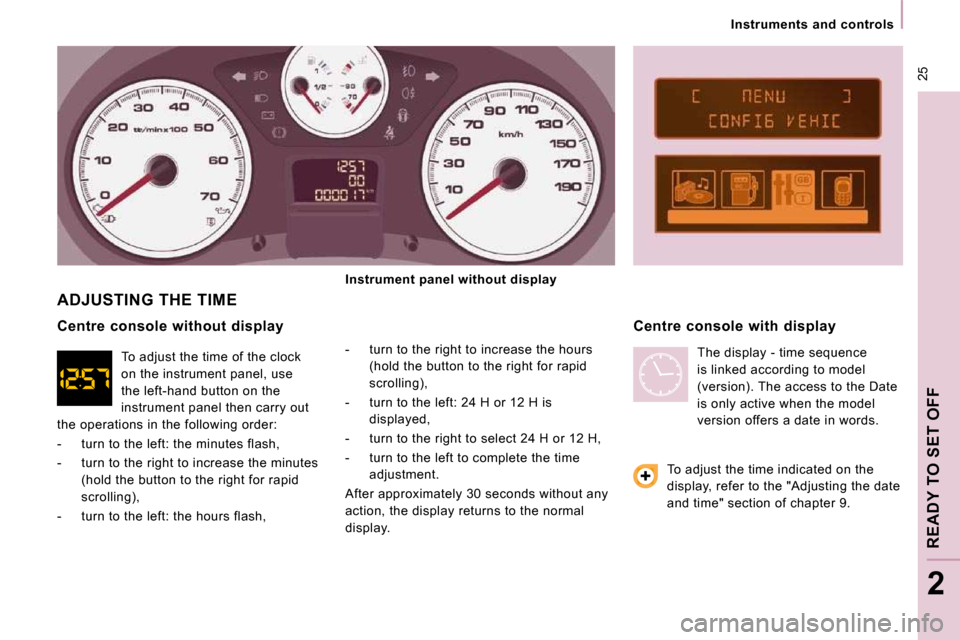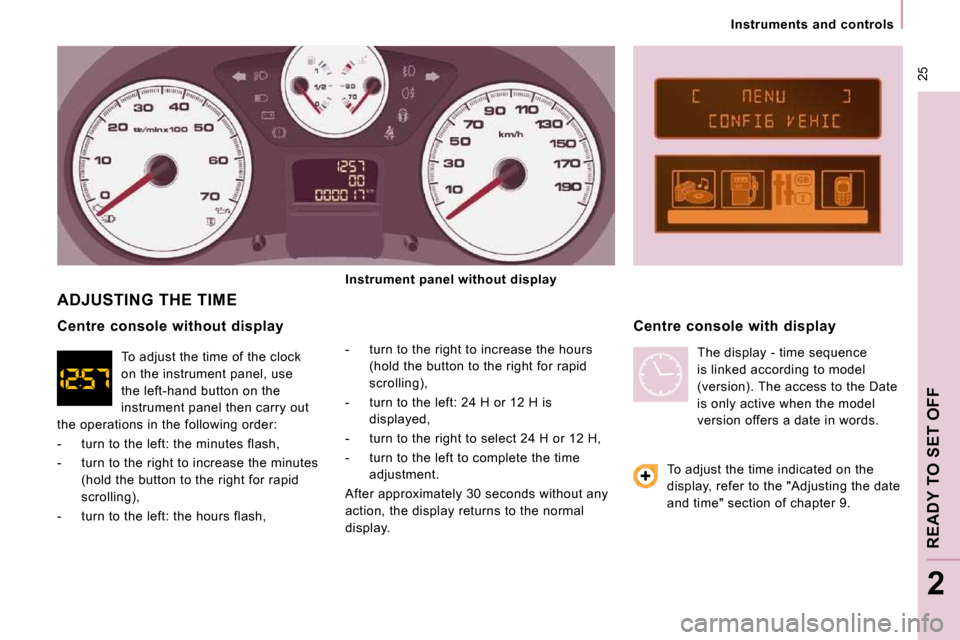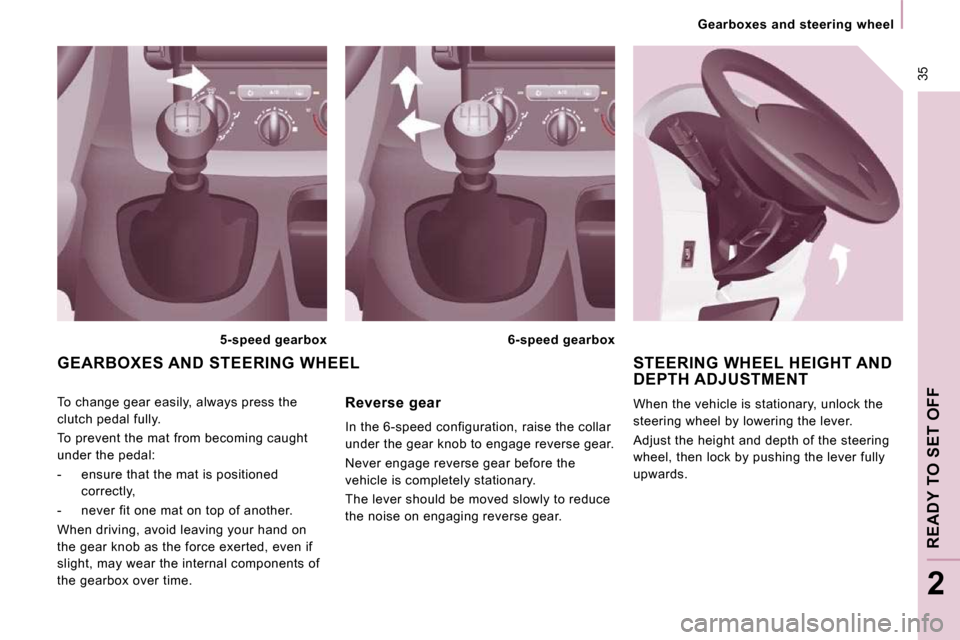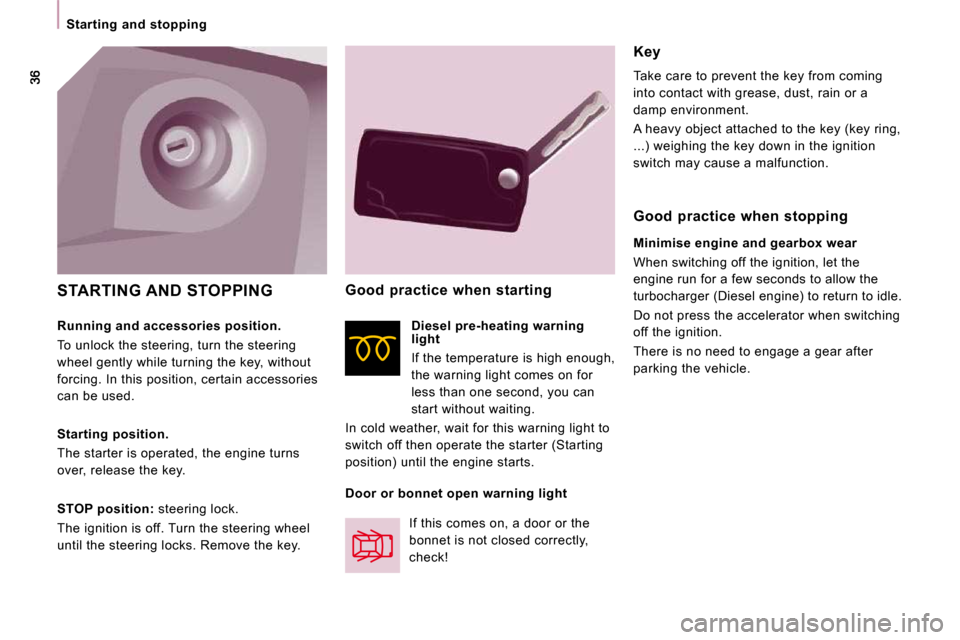lock Citroen JUMPY MULTISPACE DAG 2009.5 2.G User Guide
[x] Cancel search | Manufacturer: CITROEN, Model Year: 2009.5, Model line: JUMPY MULTISPACE DAG, Model: Citroen JUMPY MULTISPACE DAG 2009.5 2.GPages: 231, PDF Size: 11.46 MB
Page 11 of 231

22
Accesses
From the outside
Pull the handle towards you then towards
the rear. With the ignition on, press
this button, the diode is lit
accompanied by a message on
the display.
This system is independent of the central
locking control.
From the inside
To unlock and open, push the handle
towards the rear. Ensure that the door opens
fully to lock the device at the base of the
door.
Locking/electric child lock
This prevents opening of the side doors from
the inside. Good practice
Do not drive with the sliding side door open.
Always remove the key from the ignition
when leaving the vehicle, even for a short
time.
Each time you switch on the ignition, check
whether the child lock is active (diode lit).
In the event of a serious impact, the electric
child lock is deactivated automatically. Operation in the event of a battery
failure
Front and side passenger doors
In the event of a malfunction of the battery
or of the central locking, use the lock to lock
the doors mechanically.
� To open the door and get out of the
vehicle, pull the interior control.
� To lock the door, insert the key in the
lock, located on the edge of the door,
then turn it one eighth of a turn .
Driver's door
� Insert the key in the lock, then turn it to
the right to lock or to the left to unlock.
Page 12 of 231

23
Accesses
READY TO SET OFF
2
HINGED REAR DOORS
When parked with the rear
doors open to 90°, the doors
mask the rear lights. To signal your position to
road users travelling in the
same direction who may
not have noticed that you
have stopped, use a warning
triangle or any other device
stipulated by the legislation
and regulations of your
country.
TAILGATE
From the outside
The two hinged doors open to 90°.
To open, pull the handle towards you then
pull the lever to open the left-hand door.
To close, start with the left-hand door then
close the right-hand door.
Opening to 180°
A retractable check strap system permits
extension of the opening from 90° to 180°.
Disengage the check strap towards you
when the door is partially open.
The check strap will re-attach automatically
on closing. From the outside
If fitted on your vehicle, locking/unlocking is
via the remote control.
To open, press the control then raise the
tailgate.
A strap is provided to secure the tailgate in
the upper position.
From inside
Emergency control
In the event of a central unlocking operating
fault, this permits unlocking of the tailgate
from the inside.
Fold the rear seats to gain access to the lock.
Insert a small screwdriver in this opening to
unlock the tailgate.
Page 14 of 231

25
Instruments and controls
READY TO SET OFF
2
ADJUSTING THE TIME
- turn to the right to increase the hours (hold the button to the right for rapid
scrolling),
- turn to the left: 24 H or 12 H is displayed,
- turn to the right to select 24 H or 12 H,
- turn to the left to complete the time adjustment.
After approximately 30 seconds without any
action, the display returns to the normal
display. Centre console with display
Centre console without display
To adjust the time indicated on the
display, refer to the "Adjusting the date
and time" section of chapter 9.
Instrument panel without display
To adjust the time of the clock
on the instrument panel, use
the left-hand button on the
instrument panel then carry out
the operations in the following order:
- turn to the left: the minutes flash,
- turn to the right to increase the minutes (hold the button to the right for rapid
scrolling),
- turn to the left: the hours flash, The display - time sequence
is linked according to model
(version). The access to the Date
is only active when the model
version offers a date in words.
Page 15 of 231

25
Instruments and controls
READY TO SET OFF
2
ADJUSTING THE TIME
- turn to the right to increase the hours (hold the button to the right for rapid
scrolling),
- turn to the left: 24 H or 12 H is displayed,
- turn to the right to select 24 H or 12 H,
- turn to the left to complete the time adjustment.
After approximately 30 seconds without any
action, the display returns to the normal
display. Centre console with display
Centre console without display
To adjust the time indicated on the
display, refer to the "Adjusting the date
and time" section of chapter 9.
Instrument panel without display
To adjust the time of the clock
on the instrument panel, use
the left-hand button on the
instrument panel then carry out
the operations in the following order:
- turn to the left: the minutes flash,
- turn to the right to increase the minutes (hold the button to the right for rapid
scrolling),
- turn to the left: the hours flash, The display - time sequence
is linked according to model
(version). The access to the Date
is only active when the model
version offers a date in words.
Page 19 of 231

ABS
ESP
29
Instruments and controls
READY TO SET OFF
2
Warning light is indicates Solution-action
Power steering lit. system malfunction. The vehicle retains conventional steering without
assistance.
Have the system checked by a CITROËN dealer.
Opening
detection lit and
accompanied by
a message on
the display.
access not closed correctly.
Check that the cab doors, the rear and side doors
and the
�b�o�n�n�e�t� �a�r�e� �c�l�o�s�e�d� �(�i�f� �y�o�u�r� �v�e�h�i�c�l�e� �i�s� �fi� �t�t�e�d� �w�i�t�h� �a �n� �a�l�a�r�m�)�.�
Rear
suspension
with pneumatic
compensation flashing.
abnormal difference between
the detected sill height and the
optimum sill height. In automatic correction mode: drive slowly (approximately
6 mph (10 km/h)) until the warning light is switched off.
In manual correction mode: return the sill which is still at th
e
upper or lower limit to an optimum height. Chapter 3, "Rear
suspension" section.
lit on starting or
while driving. failure of the pneumatic
compensation.
You must stop. Call a CITROËN dealer.
ABS remaining on. failure of the anti-lock braking
system. The vehicle retains conventional braking without
assistance but you are advised to stop. Call a CITR
OËN
dealer.
ESP flashing.
triggering of regulation by the
ESP. The system optimises drive and permits improvement
of
the directional stability of the vehicle. Chapter 4 , "Driving
safety" section.
remaining on. system malfunction. E.g.: under-
inflation of the tyres. E.g. Check the pressure of the tyres. Have them
checked by a CITROËN dealer.
remaining on
with the diode on
the button (on
the fascia) lit. deactivation of the system at the
request of the driver.
Operation of the system is deactivated.
Reactivation is automatic above 30 mph (50 km/h) o
r
after pressing the button (on the fascia).
Page 25 of 231

34
Instruments and controls After this operation, if you wish to
disconnect the battery, lock the vehicle
and wait for at least five minutes, otherwise
the zero re-set will not be registered.
Zero re-set
Your CITROËN dealer carries out this
operation after each service.
However, if you carry out the service
yourself, the re-set procedure is as follows:
- switch off the ignition,
- press and hold the trip recorder reset
button,
- switch on the ignition.
The display begins a countdown.
When the display shows "=0" , release the
button; the spanner disappears.
Engine oil level indicator
When the ignition is switched on, the engine
oil level is indicated for a few seconds, after
the service information. Oil level correct
Lack of oil
Flashing of
"OIL" , linked
with the service warning
light, accompanied by
an audible signal and a
message on the display, indicates a lack of
oil which could damage the engine.
If the lack of oil is confirmed by a check
using the dipstick, it is essential that the
level is topped up.
Oil level gauge fault
Flashing of "OIL --"
indicates a malfunction
of the engine oil level
gauge. Consult a
CITROËN dealer.
The level read will only be correct if
the vehicle is on level ground and the
engine has been off for more than 15 minutes. Dipstick
A = maximum, never exceed
this level as a surplus of oil may
damage the engine.
Contact a CITROËN dealer
without delay.
B = minimum, top up the level via
the oil filler cap, using the type of
oil suited to your engine.
Trip recorder zero reset
button
With the ignition on, press the
button until the zeros appear.
Lighting rheostat
With the lights on, press the
button to vary the intensity of
the lighting of the instruments
and controls. When the
lighting reaches the minimum (or maximum)
setting, release the button then press it
again to increase (or reduce) the brightness.
As soon as the lighting is of the required
brightness, release the button.
Page 26 of 231

34
Instruments and controls After this operation, if you wish to
disconnect the battery, lock the vehicle
and wait for at least five minutes, otherwise
the zero re-set will not be registered.
Zero re-set
Your CITROËN dealer carries out this
operation after each service.
However, if you carry out the service
yourself, the re-set procedure is as follows:
- switch off the ignition,
- press and hold the trip recorder reset
button,
- switch on the ignition.
The display begins a countdown.
When the display shows "=0" , release the
button; the spanner disappears.
Engine oil level indicator
When the ignition is switched on, the engine
oil level is indicated for a few seconds, after
the service information. Oil level correct
Lack of oil
Flashing of
"OIL" , linked
with the service warning
light, accompanied by
an audible signal and a
message on the display, indicates a lack of
oil which could damage the engine.
If the lack of oil is confirmed by a check
using the dipstick, it is essential that the
level is topped up.
Oil level gauge fault
Flashing of "OIL --"
indicates a malfunction
of the engine oil level
gauge. Consult a
CITROËN dealer.
The level read will only be correct if
the vehicle is on level ground and the
engine has been off for more than 15 minutes. Dipstick
A = maximum, never exceed
this level as a surplus of oil may
damage the engine.
Contact a CITROËN dealer
without delay.
B = minimum, top up the level via
the oil filler cap, using the type of
oil suited to your engine.
Trip recorder zero reset
button
With the ignition on, press the
button until the zeros appear.
Lighting rheostat
With the lights on, press the
button to vary the intensity of
the lighting of the instruments
and controls. When the
lighting reaches the minimum (or maximum)
setting, release the button then press it
again to increase (or reduce) the brightness.
As soon as the lighting is of the required
brightness, release the button.
Page 27 of 231

35
Gearboxes and steering wheel
READY TO SET OFF
2
STEERING WHEEL HEIGHT AND DEPTH ADJUSTMENT
When the vehicle is stationary, unlock the
steering wheel by lowering the lever.
Adjust the height and depth of the steering
wheel, then lock by pushing the lever fully
upwards.
To change gear easily, always press the
clutch pedal fully.
To prevent the mat from becoming caught
under the pedal:
- ensure that the mat is positioned
correctly,
- never fit one mat on top of another.
When driving, avoid leaving your hand on
the gear knob as the force exerted, even if
slight, may wear the internal components of
the gearbox over time.
GEARBOXES AND STEERING WHEEL
5-speed gearbox 6-speed gearbox
Reverse gear
In the 6-speed configuration, raise the collar
under the gear knob to engage reverse gear.
Never engage reverse gear before the
vehicle is completely stationary.
The lever should be moved slowly to reduce
the noise on engaging reverse gear.
Page 28 of 231

Starting and stopping
STARTING AND STOPPING
Key
Take care to prevent the key from coming
into contact with grease, dust, rain or a
damp environment.
A heavy object attached to the key (key ring,
...) weighing the key down in the ignition
switch may cause a malfunction.
Starting position.
The starter is operated, the engine turns
over, release the key.
STOP position: steering lock.
The ignition is off. Turn the steering wheel
until the steering locks. Remove the key. Good practice when starting
If this comes on, a door or the
bonnet is not closed correctly,
check! Diesel pre-heating warning
light
If the temperature is high enough,
the warning light comes on for
less than one second, you can
start without waiting.
In cold weather, wait for this warning light to
switch off then operate the starter (Starting
position) until the engine starts. Good practice when stopping
Minimise engine and gearbox wear
When switching off the ignition, let the
engine run for a few seconds to allow the
turbocharger (Diesel engine) to return to idle.
Do not press the accelerator when switching
off the ignition.
There is no need to engage a gear after
parking the vehicle.
Running and accessories position.
To unlock the steering, turn the steering
wheel gently while turning the key, without
forcing. In this position, certain accessories
can be used.
Door or bonnet open warning light
Page 60 of 231

68
Seats
Handling Folding the seat back
to the table position
(centre seat example)
- Place the head restraints in the low position.
- Raise this handle to unlock the seat back (from the rear, lower the handle).
- Tilt the seat back onto the seat cushion. Seat and bench of type 1:
- Raise the seat.
Seat and bench of type 2/type 3:
- Fold the seat back to the table position using this handle.
- Raise the seat. - Unlock the front feet using this handle.
- Disengage the seat from its anchorages.
- Remove the seat from the vehicle via
the side door in row 2 and via the rear in
row 3.
- Unlock the front feet using this handle.
- Disengage the seat from its anchorages.
- Remove the seat from the vehicle via
the side door in row 2 and via the rear in
row 3.
Enter, exit the vehicle: raise the seat
Always start with the individual seat located
on the right-hand side and place the head
restraint in the low position.